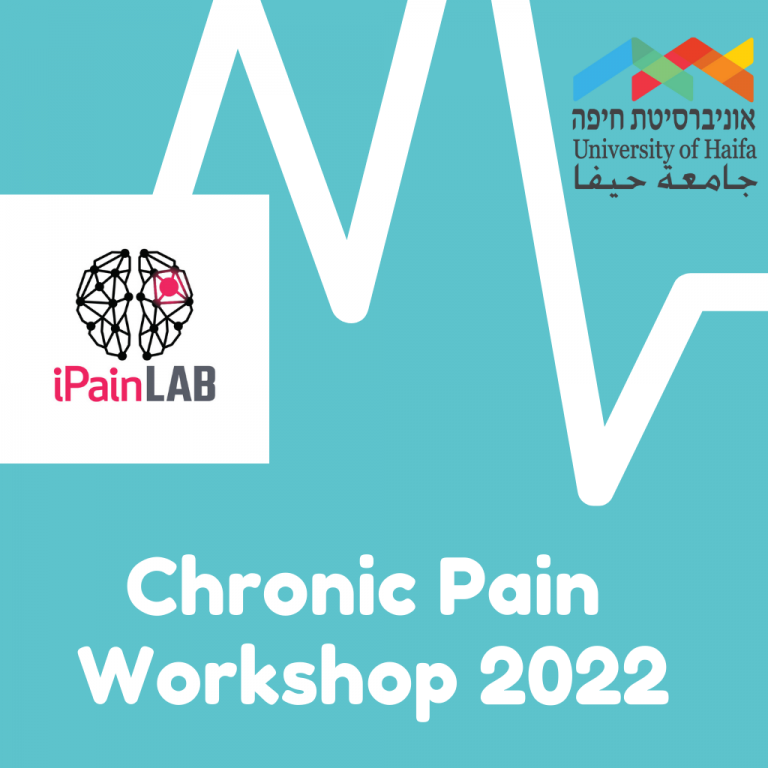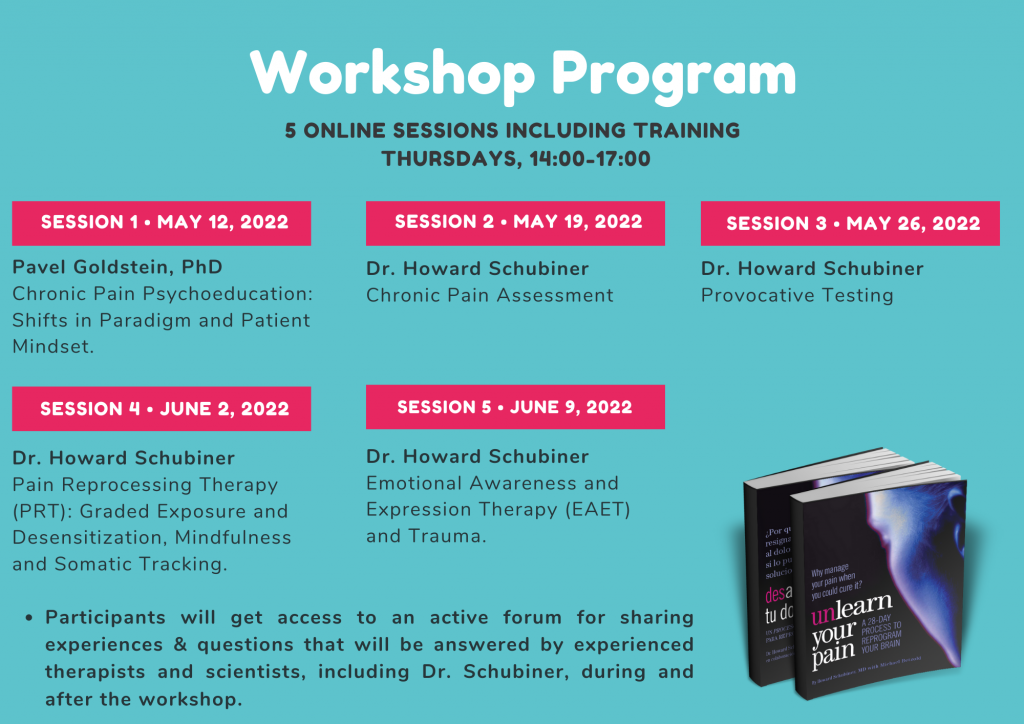
Dr. Howard Schubiner
Diagnosing and treating chronic pain: Dr. Howard Schubiner’s workshop for Israeli practitioners
- Recent research has demonstrated the efficacy of our therapeutic approaches for treating various chronic pain conditions.
- Dr. Howard Schubiner has been at the forefront of research, clinical practice, and training using this novel approach.
- This opportunity is open for practitioners who are interested in treating chronic pain patients with cutting edge, evidence-based tools and skills.
Is it for me?
- This workshop has been developed primarily for:
- Medical Practitioners
- Physiotherapists
- Psychotherapists
- Occupational Therapists
- Art Therapists
- Social Workers
- Counselors
- Coachers (personal growth)
- Nurses
What will I gain?
- Novel diagnostic tools for chronic pain
- Novel therapeutic approaches for chronic pain
- Understanding chronic pain processing
- Tools and materials to educate your patients
- Satisfied patients, improving their condition or even completely releasing the pain
Payment & Registration
1500 NIS
for 5 online sessions, 3 hour each
Limited number of seats!
About Dr. Schubiner
Dr. Howard Schubiner is the founder and director of the Mind-Body Medicine Program at Providence Hospital. He was included in the 2003-04, 2005-06 and 2007-08 lists of the Best Doctors in America.
Dr. Howard Schubiner is board-certified in pediatrics, adolescent medicine, and internal medicine. He was a full Professor at Wayne State University for 18 years and now works at Providence Hospital in Southfield, MI. He is a fellow in the American College of Physicians, the American Academy of Pediatrics, and the Society for Adolescent Medicine.
Dr. Schubiner has created a program that uses both meditative and cutting-edge psychological techniques to help individuals with chronic conditions, such as fibromyalgia, whiplash, back and neck pain, myofascial pain, TMJ syndrome, tension and migraine headaches, irritable bowel syndrome, irritable bladder syndrome, insomnia, anxiety, and other related conditions.
In his internationally acclaimed book Unlearn Your Pain, Dr. Schubiner demonstrated that the underlying cause for many chronic pain conditions is nerve sensitization along with learned nerve pathways, rather than actual tissue destruction. Dr. Schubiner used this new understanding to develop a novel unique program to reverse pain. Current research supports the effectiveness of this program.
About Pavel Goldstein, PhD
Head of Integrative Pain (iPain) Laboratory, Head of MPH Biostatistics track at the School of Public Health, Social Welfare & Health Sciences Faculty, The University of Haifa.
Pavel’s research is essential for more than pure knowledge. Ultimately, his future research is driven by the need to integrate the academy and healthcare. Providing consultations for clinicians, academic researchers, helped him to acquire a “common ground” between academic investigators, and healthcare providers. When all parties see the advantage of combining the clinical insights with the academic urge to ‘understand how it works’, the final outcomes improve significantly.
Chronic pain and the brain
Pain is predominantly thought of as a result of injury or tissue damage. We frequently see chronic pain caused by “structural” issues. However, recent research has demonstrated that there is often no identifiable structural cause of pain. Pain is a signal of danger generated by our brains to alert us to bodily threats but sometimes, we can be in pain even when there is no actual threat to the body. It has been shown that chronic pain affects the functionality of our brain due to neuroplasticity (1): when the brain experiences pain over and over, some neural connections are enhanced (2,3) and the brain learns the pain that becomes persistent (1,4).
- Hashmi, J. A., Baliki, M. N., Huang, L., Baria, A. T., Torbey, S., Hermann, K. M., … & Apkarian, A. V. (2013). Shape shifting pain: chronification of back pain shifts brain representation from nociceptive to emotional circuits. Brain, 136(9), 2751-2768.
- Baliki, M. N., & Apkarian, A. V. (2015). Nociception, pain, negative moods, and behavior selection. Neuron, 87(3), 474-491.
- Woolf, C. J. (2011). Central sensitization: implications for the diagnosis and treatment of pain. Pain, 152(3), S2-S15.
- Seymour, B. (2019). Pain: a precision signal for reinforcement learning and control. Neuron, 101(6), 1029-1041.
Fear and avoidance can strengthen pain 5,6. By feeling fear and avoiding pain, we create a new brain scheme boosting pain as a signal of danger. In turn, it is enhancing fear and avoidance. In this vicious cycle, the pain results in more fear and avoidance, and the fear and avoidance result in more pain.
5. Vlaeyen, J. W., & Crombez, G. (2020). Behavioral conceptualization and treatment of chronic pain. Annual review of clinical psychology, 16, 187-212.
6. Meulders, A. (2020). Fear in the context of pain: Lessons learned from 100 years of fear conditioning research. Behaviour research and therapy, 131, 103635.
Our solution
Is a set of techniques aimed at breaking the pain-fear cycle, correcting the misinterpretation, and teach the brain that the currently painful sensations are in fact safe and not dangerous.
Is an integration of “explaining pain” model, exposure therapy, exposure-based cognitive-behavioral therapies, intensive short-term psychodynamic therapy, and other approaches.
This is recently developed approach has been scientifically validated.
References:
- Ashar, Y. K., Gordon, A., Schubiner, H., Uipi, C., Knight, K., Anderson, Z., Carlisle, J., Polisky, L., Geuter, S., Flood, T. F., Kragel, P. A., Dimidjian, S., Lumley, M. A., & Wager, T. D. (2022). Effect of Pain Reprocessing Therapy vs Placebo and Usual Care for Patients With Chronic Back Pain: A Randomized Clinical Trial. JAMA Psychiatry , 79(1), 13–23.
- Lumley, Schubiner, Clauw, “Emotional Awareness and Expression Therapy for Fibromyalgia,” PAIN, 2017.
- Lumley, Schubiner, “EAET for Chronic Pain. Rationale, Principles and Techniques, Evidence, and Review,” Current Rheumatology Reports, 2019.
"This Might Hurt"
This Might Hurt is a documentary that offers solutions to cure chronic pain. The film follows chronic pain patients who have spent years trying to cure their illness through modern medicine. Desperate for relief, they enter a new, science-based medical program — run by Dr. Howard Schubiner — that focuses on uncovering hidden causes of pain and retraining their brains to switch the pain off.

